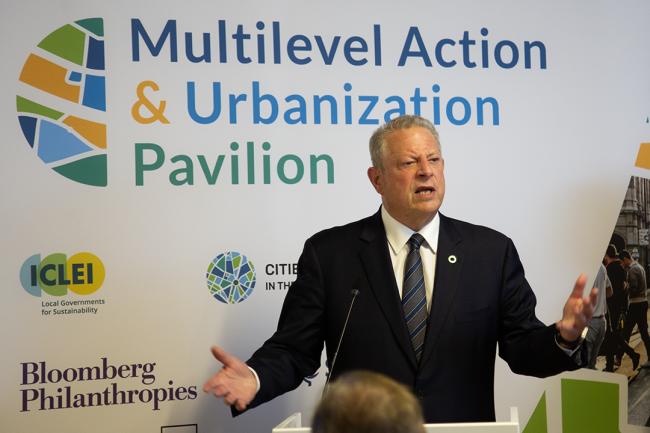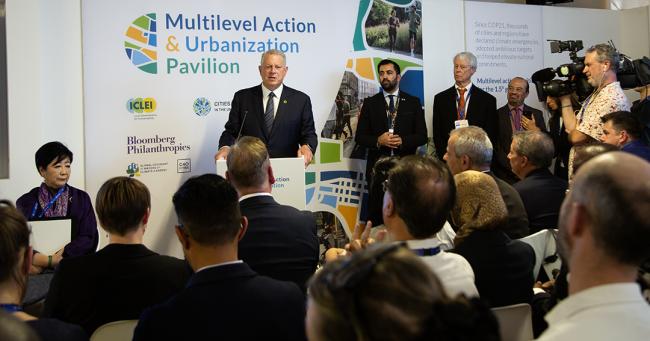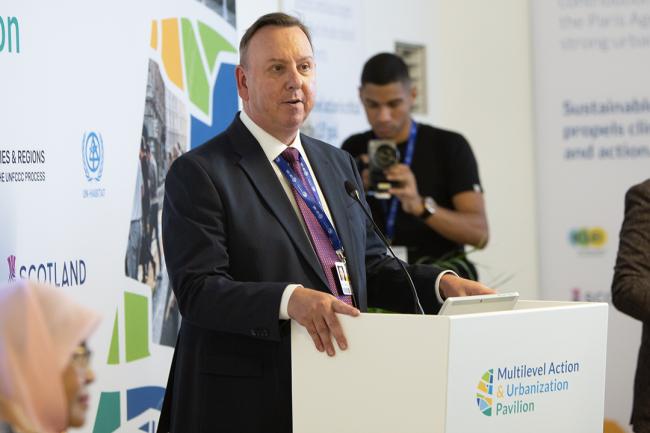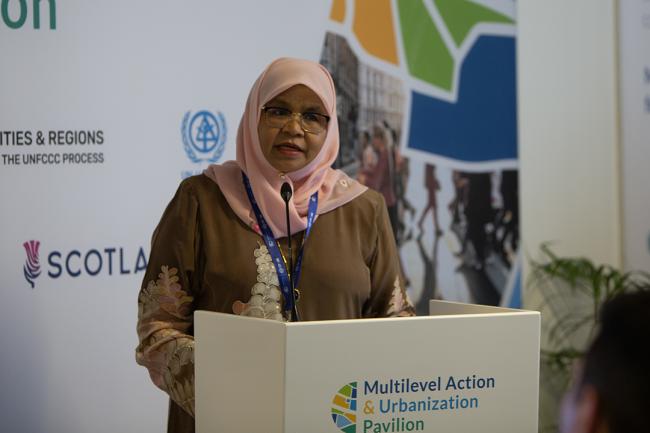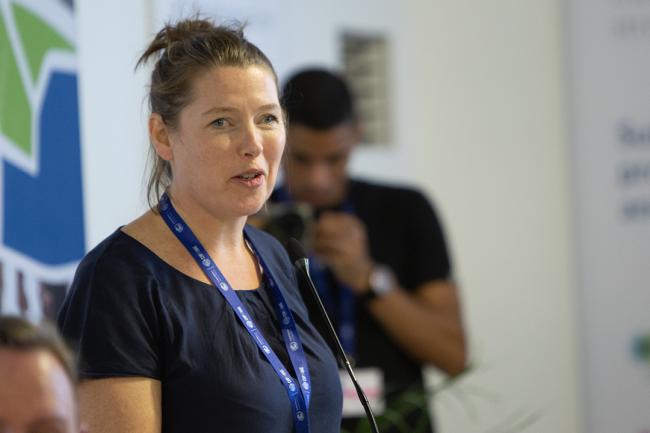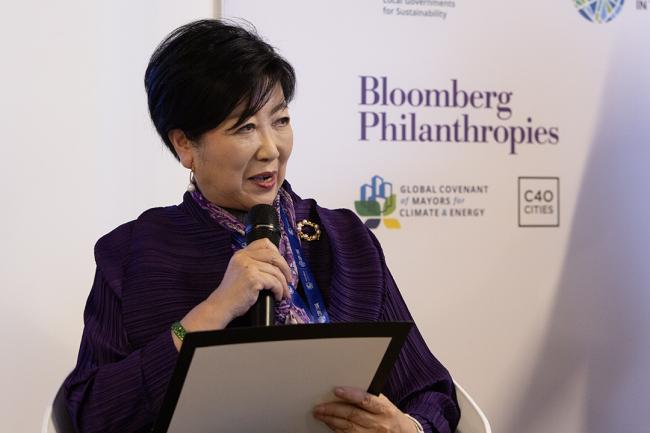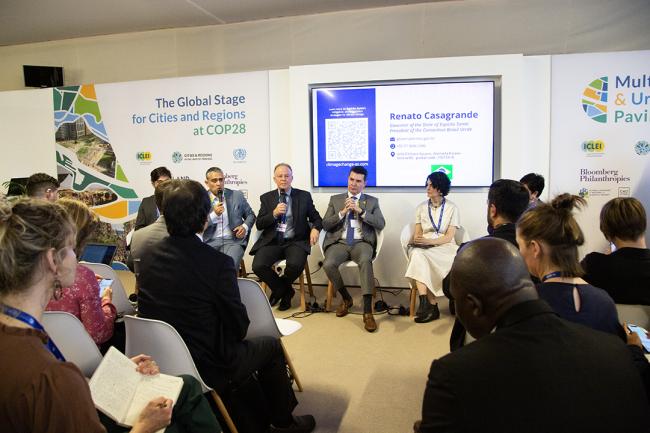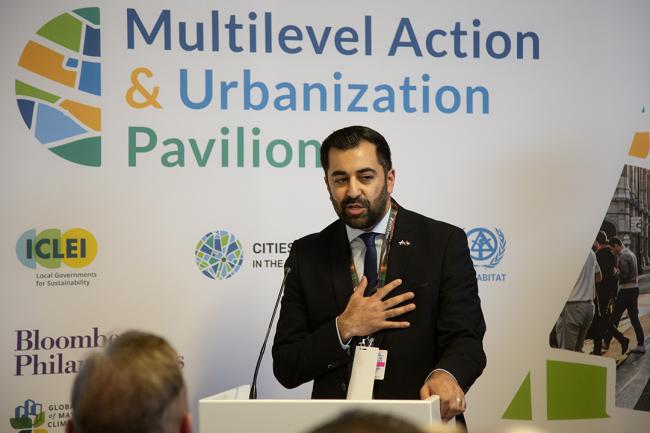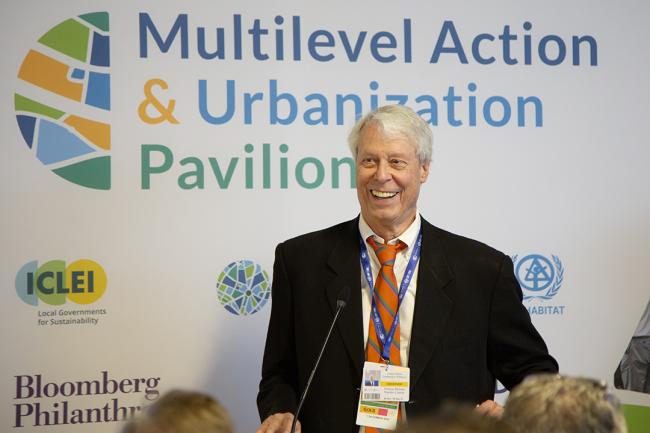About
Former US Vice President Al Gore joined local, subnational, and UN leaders to underscore the crucial role of multilevel connections and collaborations in achieving effective and just climate action.
Connections and collaborations between local, national, and global levels of governance are essential for effective and just climate action. This event, launching the Multilevel Action & Urbanization Pavilion and co-convened by UN-Habitat and ICLEI - Local Governments for Sustainability (ICLEI) in its role as the focal point of the Local Governments and Municipal Authorities (LGMA), brought together diverse leaders to highlight the crosscutting need to connect with people and communities at the frontlines of climate change.
In a keynote speech, former US Vice President Al Gore thanked local and subnational leaders for pushing climate action, underscoring that “political will is itself a renewable resource.” Gore compared the climate movement to the “great moral-based” movements of the past, such as the US Civil Rights and Women’s Suffrage movements, noting that the clarity of what’s right and wrong bolsters these types of movements even when those involved feel despair. He underscored the need to end fossil fuel subsidies and to fight back against the power of fossil fuel interests to stop climate change. “Don’t ever doubt that we can do this […] All those movements had one thing in common: When distractions and underbrush were cleared away and the central issue was revealed as a choice between right and wrong […] the outcome became foreordained.”
Gino Van Begin, ICLEI Secretary General, called the pavilion a place for networks of cities and states to send the “strong signals and message [...] that it is essential to engage with and support subnational government action to keep us on track.”
In welcome remarks, Maimunah Mohd Sharif, Executive Director, UN-Habitat, stressed the “power of collaboration” between different levels of government and said that even though the Global Stocktake shows “our collective failure” to meet the commitment of the Paris Agreement, she is “fully convinced that we can turn things around together.”
Jemima Gordon-Duff, Government of Scotland, a co-host of the Pavilion, pointed to Scotland’s financial commitments to loss and damage and underscored the need to keep “challenging each other to do better” in ensuring a just transition to clean energy.
Katrin Jammeh, ICLEI, noted the gap in funding for climate action at the local level, pointing out that even though cities account for 70% of greenhouse gas emissions, the local level receives less than 15% of global funding.
During a Multi-level Action Dialogue, Nina Hachigian, US Special Representative for City and State Diplomacy, noted that “local efforts can create a domino effect that can lead to positive change at a global scale.” She pointed to a Port of Los Angeles and Long Beach, California, initiative to create a clean truck program that was bolstered by state and federal funding and inspired global efforts to implement green shipping.
Jader Filho, Minister of Cities, Brazil, stressed that “Brazil is coming back”, highlighting the work that President Lula’s government has done to reduce deforestation by 40% in 2023 while bolstering affordable housing, job creation, and sustainable infrastructure development in Amazonian cities. He acknowledged the need for climate finance to flow to the local level to support cities and their citizens.
Yuriko Koike, Governor of Tokyo, announced the launch of the Sustainable HIgh City (SusHI) Tech Tokyo initiative in pursuit of the city’s commitment to half their carbon emissions by 2030 and reach net-zero by 2050. Koike showcased perovskite solar panels to be installed on city infrastructure to generate electricity, as well as Artificial Intelligence (AI) technology for flood management that will enhance urban resilience.
Renato Casagrande, Governor of the State of Espírito Santo, Brazil, emphasized the role the Green Brazil Consortium is playing in supporting climate mitigation and adaptation plans with subnational governments across the country. Casagrande called for hard action, and not just talk, to support those most vulnerable to the effects of climate change and the collective responsibility of states to act together to achieve the country’s net-zero 2050 target.
Following the panel, Humza Yousaf, First Minister, Government of Scotland, noted the COP 28 agreement to operationalize the loss and damage fund, saying that though many in the Global South have expressed concern about it, “let’s not allow perfection be the enemy of the good,” noting that progress is important. He emphasized the responsibility of the Global North to “repair the damage” caused by climate change, calling tackling the climate crisis “fundamentally an issue of justice.”
Frank Cownie, ICLEI, noted how Al Gore’s 2006 film introduced so many people to the “inconvenient truth” that climate change is, in fact, occurring and poses risks today and for future generations.
Addressing participants, Gore called for enhanced collaboration across all governing bodies at all levels. “I am deeply inspired by the collective efforts of local communities, by mayors and elected leaders, and by the residents that support you in your leadership,” he concluded.
Organizers: ICLEI, UN-Habitat, Scottish Government, Bloomberg Philanthropies, the Global Covenant of Mayors for Climate & Energy (GCoM) and C40 Cities.
Contact: Ariel Dekovic | ariel.dekovic@iclei.org
For more information: https://iclei.org/
